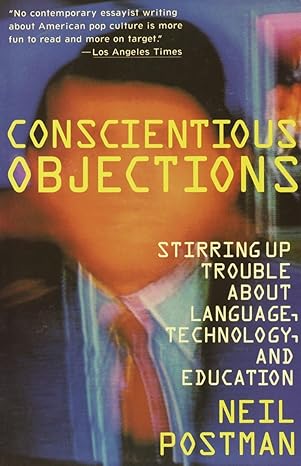Conscientious Objections (1988)

In Conscientious Objections, Neil Postman gathers essays that model how to be a principled skeptic. He challenges popular assumptions about language, education, technology, and media, asking what kinds of people our institutions are designed to produce. Rather than accept the spirit of the age, Postman invites readers to slow down, define terms, and defend human-scale values.
Across classrooms and newsrooms, boardrooms and living rooms, Postman argues that clarity of language is a civic duty and that tools must serve purposes we can name. These essays refine the habits of critical inquiry that run through his work—offering bite-size provocations that remain timely in a culture obsessed with novelty and speed.
To object conscientiously is to take responsibility for our words, our tools, and the worlds they make.
Key Ideas from the Book
- Language as Moral Action: Define terms, separate description from evaluation, and resist euphemism.
- Education’s Telos: Schooling should cultivate judgment, not merely certify competence or deliver information.
- Technology with a Purpose: Ask what human problem a device solves—and what forms of life it displaces.
- Media Ecologies: Forms of communication favor some ideas and silence others; tools are never neutral.
- Civic Skepticism: Be loyal to questions before slogans; prefer evidence to enthusiasm.
Why It Still Matters
Postman’s objections are a playbook for cultural self-defense. Educators, designers, policy makers, and readers can use these essays to build institutions that protect attention, language, and humane purposes amid accelerating change.